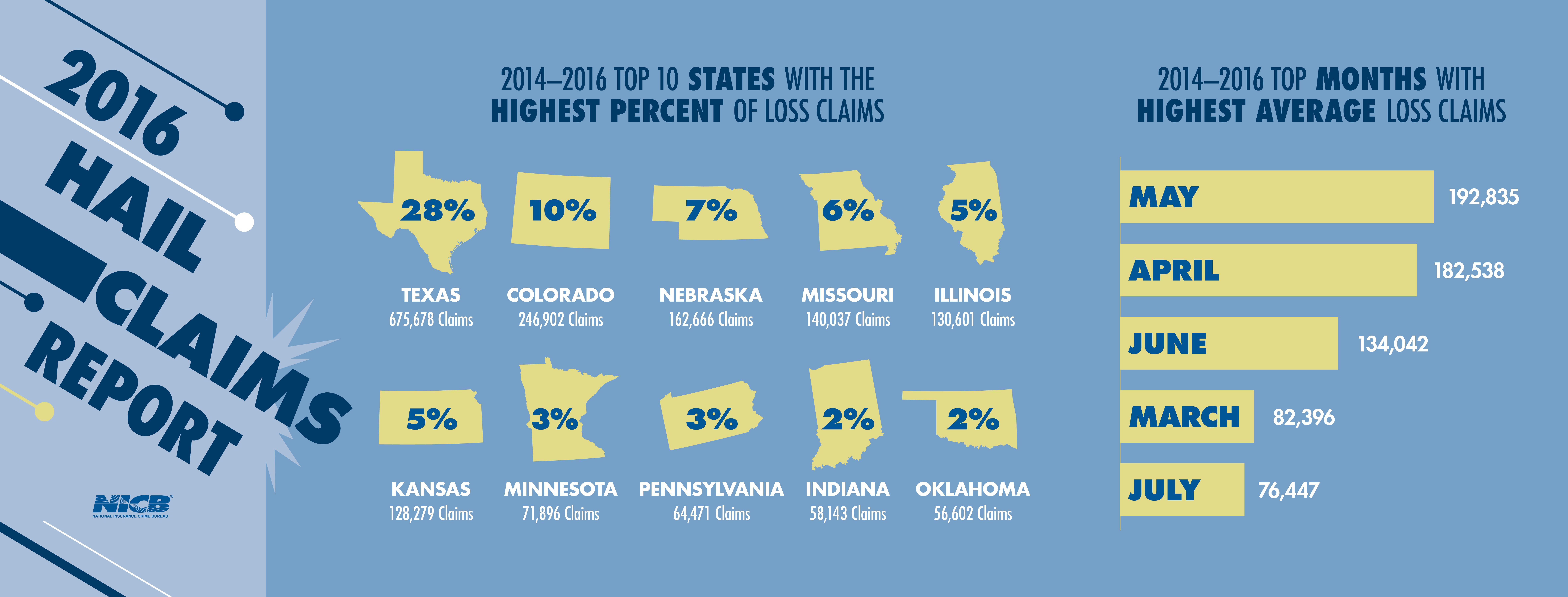Texas Losses Skyrocketed as Claims Rose by 48 Percent Nationwide
DES PLAINES, Ill., May 31, 2017 — Everything is big in Texas, including hailstorms. The National Insurance Crime Bureau (NICB) said today that insurance claims for hail damage in Texas last year exceeded the previous two years combined.
Hail damage fluctuates year-to-year, but 2016 was a particularly devastating year across the country. An analysis of insurance claims from the Insurance Services Office (ISO) ClaimSearch database showed that after decreasing by 21 percent from 2014 to 2015, the number of hail claims nationwide jumped 48 percent to more than 965,000 in 2016.
Texas totaled more than four times as many hail claims as the second leading state, Colorado, and had 39 percent of all the claims filed last year.
San Antonio’s devastating hailstorms in 2016 resulted in 68,778 claims with Colorado Springs reporting 33,595.
Across the nation, most hail claims, 55 percent, were for home damage with personal auto damage representing 32 percent of all hail claims.
The NICB consistently warns storm victims to be on the lookout for fraudulent roofers and contractors following a disaster.
Almost all of these scams are unsolicited—they begin with a visit from a contractor who seeks to help victims rebuild. That is why NICB recommends that “if you didn’t request it, reject it.” Before hiring any contractor, call your insurance company. Your insurance company will honor its policy so there is no need to rush into an agreement with a contractor who solicits your repair work—especially when you did not request it.
NICB suggests you consider these tips before hiring a contractor:
- Get more than one estimate.
- Get everything in writing. Cost, work to be done, time schedules, guarantees, payment schedules and other expectations should be detailed.
- Demand references and check them out.
- Ask to see the salesperson’s driver’s license and write down the license number and their vehicle’s license plate number.
- Never sign a contract with blanks; unacceptable terms can be added later.
- Never pay a contractor in full or sign a completion certificate until the work is finished and ensure reconstruction is up to current code.
- Make sure you review and understand all documents sent to your insurance carrier.
- Never let a contractor pressure you into hiring them.
- Never let a contractor interpret the insurance policy language.
- Never let a contractor discourage you from contacting your insurance company.
Consumer Resources
- For a free brochure with tips to avoid post-disaster fraud, click here.
- For useful checklists, including how to spot flood and salvage vehicle scams and post-disaster contractor repair schemes.
For free consumer access to the vehicle salvage records of participating NICB member insurance companies who collectively provide 88 percent of the auto insurance in force today, access NICB’s VINCheck.

